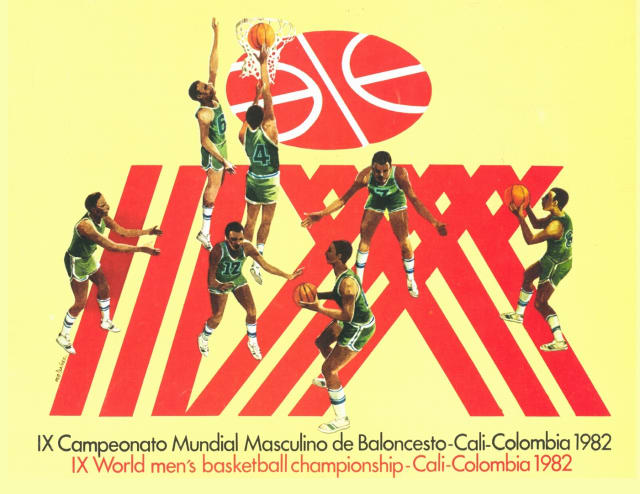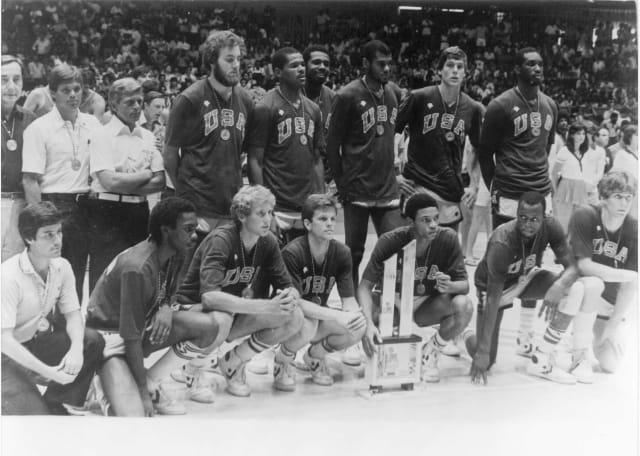The Best of 1982 World Cup: Soviet Union fend off USA in Final, Glen 'Doc' Rivers MVP, Sabonis the rookie
The FIBA Basketball World Cup returned to the Americas in 1982 with Colombia hosting the globe. Soviet Union defeated USA in the Final for their third world title and Yugoslavia grabbed third place.
MIES (Switzerland) - The FIBA Basketball World Cup returned to the Americas in 1982 with Colombia hosting the globe. The tournament was dominated by the usual powers with Soviet Union winning their third title as they defeated United States in the Final and Yugoslavia took third place.
Cold War era combatants Soviet Union and USA battled in a thrilling finale that came down to the buzzer as the Europeans won 95-94 to become the first nation with three World Cup trophies. The reigning champions Yugoslavia lost to both USA and Soviet Union in the Final Round and were left to beat Spain in the third place game for their sixth straight podium finish.
The best team: Soviet Union
| Rank | Team | W-L |
| 1. | Soviet Union | 8-1 |
| 2. | USA | 7-2 |
| 3. | Yugoslavia | 7-2 |
| 4. | Spain | 6-3 |
| 5. | Australia | 4-4 |
| 6. | Canada | 3-5 |
| 7. | Colombia | 0-6 |
| 8. | Brazil | 4-3 |
| 9. | Panama | 4-3 |
| 10. | Czechoslovakia | 4-3 |
| 11. | Uruguay | 2-5 |
| 12. | China | 1-6 |
| 13. | Cote d'Ivoire | 0-7 |
The 1982 World Cup, then known as the FIBA World Championship, was hosted in Colombia, a country that was making its debut in the competition. The games were played in Cali, Bogota, Medellin, Bucaramanga and Cucuta from August 15 to 28.
After two World Cups with 14 participants, the field included 13 teams: hosts Colombia; reigning champs Yugoslavia; the top three qualified teams from the 1980 Olympics - Soviet Union, Spain, Brazil (who finished third, fourth and fifth, respectively, but took the places of already qualified Yugoslavia and Italy, who refused to play in the World Cup because the dates interfered with the start of the 1982-83 Italian league season); the next highest team from FIBA EuroBasket Czechoslovakia; South American winners Uruguay; CentroBasket champion Panama; Asian winner China; African champion Cote d'Ivoire; Oceanian winner Australia; and invited North American teams USA and Canada.
After two World Cups in which the holders received a bye for the Preliminary Round, the format changed to only the hosts skipping the first phase. The other 12 teams were drawn into three groups of four teams, playing each other and the top two finishers moving to the Final Round. The top two finishers in the group would play for the title and the third and fourth placed teams would face off for the final spot on the podium.
As expected, Soviet Union and Yugoslavia won their preliminary groups but Spain surprised USA 109-99 to take first place in Group A. USA, Australia and Canada advanced into the Final Round as the second placed teams in the groups - Australia ousting Brazil with a 75-73 win and Canada outlasting Czechoslovakia 104-99.

With their backs against the wall having a loss carry over from the first stage, United States bounced back in the Final Round and defeated Yugoslavia 88-81 in their first game. Yugoslavia saw their chances of defending their title diminish greatly when Soviet Union beat them three days later 99-94, coming back from a halftime deficit. And USA knocked off Soviet Union 99-93 on the penultimate day of the Final Round to then set the stage for another showdown between the countries for the 1982 crown.
Yugoslavia and Spain faced off for third place and Yugoslavia's past heroes Drazen Dalipagic and Dragan Kicanovic combined for 39 points in a thrilling 119-117 win over Spain. It was Yugoslavia's sixth straight podium finish and first third-placed showing.
United States and Soviet Union went at it in the Final and each team led in a tight, intense game. In the end, the Soviets managed to hold on for a 95-94 victory. Anatolij Myshkin scored 29 points to lead the Europeans while Glenn "Doc" Rivers scored 24 points in the loss. Soviet Union added the 1982 crown to their world titles from 1967 and 1974.
The best player: Glenn "Doc" Rivers MVP
For the fourth time in the last five tournaments, the Most Valuable Player of the 1982 World Cup was not part of the winning team with Glenn "Doc" Rivers of United States receiving the honor.
 Glenn "Doc" Rivers with hand on trophy
Glenn "Doc" Rivers with hand on trophy
Rivers was the leader of one of the strongest USA teams in some times at the World Cup. The future NBA All-Star player and NBA championship-winning head coach, started the tourament slowly with 9 and 10 points against China and Panama, respectively. His 18 points were not enough to keep the Americans from a Preliminary Round loss to Spain.
He tallied 18 points in both of the first two Final Round games against Yugoslavia and Colombia before picking up 13 against Canada. Rivers stepped up with 23 points in a big win over Soviet Union and finished the Final Round play with 18 points against Australia. Rivers poured in 24 points in the Final against Soviet Union but they were not enough for the win.
Rivers was joined on the All-Tournament Team by Vladimir Tkachenko and Anatolij Myshkin of champions Soviet Union, Dragan Kicanovic of Yugoslavia and Spain's Juan Antonio San Epifanio aka "Epi".
The best game : The Final between Soviet Union and USA
With Yugoslavia out of the picture, the 1982 world title would be decided between the United States and Soviet Union. USA were hungry to finally claim the crown again with their only trophy dating back to 1954. The Soviets meanwhile were out to become the first three-time world champs.The two teams played only two days earlier - the Americans needing to win to stay in the hunt for a top-two finish in the Final Round and beating the Soviets 99-93 behind 64 combined points from Rivers, Mitchell Wiggins and Jim Thomas.
In the Final, Myshkin helped Soviet Union jump out to a 33-20 lead. The scoring of Rivers and Jon Sundvold as well as the defense of Earl Jones and Antoine Carr carried USA on a 17-6 run to pull ahead 45-44 just before halftime, which had the Americans up 49-47.
The Americans started the second half better and pulled ahead 61-55. The Europeans responded with a surge of their own and led 80-73. Soviet Union were leading 95-89 with 70 seconds to play but Rivers scored and Thomas converted a three-point play to pull within 95-94 with 25 seconds remaining.
USA forced the Soviets into a jump ball with 9 seconds to go and gained possession of the ball. The Americans found Rivers on the right wing for a chance to win but his jumper was just short and the Soviets celebrated title number three.
Myshkin paced the Soviets with 29 points, Valdis Valters had 13 points and Andrej Lopatov scored 11 points while Rivers scored 24 points and both Sundvold and Wiggins chipped in 16 points.
The best story: 17-year-old Sabonis scores 28 vs Colombia
The 1982 World Cup will go down in history as the Soviet Union's last world title, but it will also be remembered for the debut of future legend Arvydas Sabonis. The 2.21m Kaunas native was still 4 months shy of his 18th birthday but Soviet coach Alexander Gomelsky still brought him to Colombia.
"I was hugely surprised to be selected," Sabonis admitted in the History of the FIBA Basketball World Cup documentary that was released in 2019.
It was a great opportunity for Sabonis to learn from fellow giant Vladimir Tkatchenko, who was still only 25 years old and already a leader of the team. Sabonis only played in five games but he showed a glimpse of what he would later become. He scored 10 points in his first ever World Cup game - a 49-point blowout of Cote d'Ivoire to start the tournament - and then totalled 6 points in games against Australia and Canada.
Gomelsky gave his youngster plenty of playing time against overwhelmed Colombia in the Final Round and Sabonis responded with a game-high 28 points in a 143-76 rout of the hosts. Sabonis would only play one more game - scoring 4 points against United States in the last game of the Final Round. He finished with 9.6 points per game.
The best performance: Rolando Frazer
Rolando Frazer of Panama had the highest scoring average of the tournament with 24.4 points over seven games. Frazer, who the year before carried Panama to their first CentroBasket title since 1969, started the tournament with 18 points against Spain. He followed that with 29 points versus the United States and tallied 31 points against China.
Frazer continued to produce in the Classification 8-13 with 17 and 19 points versus Cote d'Ivoire and Uruguay respectively, followed by 27 points against Brazil. He finished the tournament by pouring in 30 points in a tight loss to Czechoslovakia to finish ninth.
Stats leaders
Scorers
| Player (country) | Points Per Game |
| Rolando Frazer (Panama) | 24.4 |
| Ian Davies (Australia) | 23.4 |
| Bruno Ruiz (Uruguay) | 23.4 |
| Die Drisa (Cote d'Ivoire) | 21.6 |
| Dragan Kicanovic (Yugoslavia) | 21.1 |
| Oscar Schmidt (Brazil) | 21.0 |
| Stanislav Kropilak (Czechoslovakia) | 19.3 |
| Juan Antonio San Epifanio "Epi" (Spain) | 18.1 |
| Gustav Hraska (Czechoslovakia) | 18.0 |
| Jay Triano (Canada) | 17.9 |
FIBA